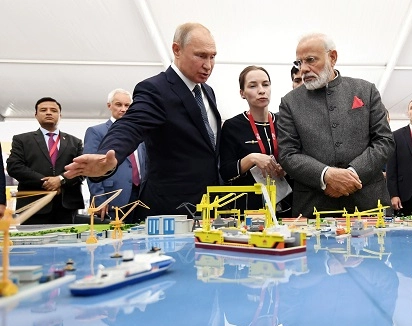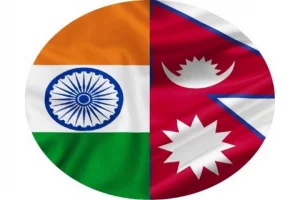Russian President Vladimir Putin will be visiting India for the Annual Bilateral Summit with Prime Minister Narendra Modi on December 6.
When the Annual Summit did not take place in 2020, the first time since it was launched in 2000 that it failed to be held, several critics gleefully commented that all was not well with India-Russia ties. They declared that the bilateral ties are on the rocks because of India’s perceived growing closeness to the US, membership of the Quad, among a host of other divisive issues.
But Putin’s visit, following a series of other significant events, visits and meetings between the two countries over the last one year, is a resounding confirmation that the bilateral ties are robust, strong and vigorous.
The first 2+2 Dialogue between the Defence and Foreign Ministers of the two countries will also take place simultaneously. This will witness a significant upgradation of the Special and Privileged Strategic Partnership between the two countries to an even higher plane as so far, India has started the 2+2 Dialogue format only with its three Quad partner countries–Australia, Japan and USA.
The first 2+2 talks levels India-Russia relationship with New Delhi's ties with its Quad partners, if not higher, in view of the substantive content of this partnership.
Russia is a time-tested partner of India. Strong and vibrant relations with Moscow constitute a fundamental pillar of India’s foreign policy. Over the last many years, some doubts were being expressed if the bilateral partnership was as resilient and strong as it was in the past. While relations today might not be at the pinnacle that they reached with the Soviet Union in August, 1971 when the Treaty of Peace, Friendship and Cooperation was signed, just before the War for Liberation of Bangladesh in December, 1971 because of different circumstances, there is no doubt that bilateral ties continue to remain dynamic, steadfast and enduring.
Also Read: Apart from the Putin-Modi summit, India and Russia will hold 2+2 talks on December 6
Although both India and Russia had explained last year that Covid-19 was the reason for not holding the Annual Summit, the critics were not satisfied. They argued that if PM Modi could hold a series of virtual Summits with several countries, the same should have been possible with Russia also. Little did they realize that the nature, scope and expanse of India-Russia ties is such that it would not be possible to do justice to them in a virtual setting.
Discussions during the Summit and the 2+2 Talks are expected to cover a wide range of subjects spanning Afghanistan, regional peace and security, geo-political situation to bilateral issues covering strategic, political, defence, commercial, economic, energy, nuclear power and people to people contacts. Coming in the wake of commencement of supplies of the S-400 Ballistic Missile Defence System by Russia to India, these discussions can be expected to take several far-reaching decisions.
Although India is not a member of the Extended Troika format and has at times been excluded by Moscow in discussions organized by it on Afghanistan, the last few months, since the Taliban assumed power in Kabul have witnessed growing convergence in the positions between the two sides. This is clearly visible in the outreach by Putin to Modi on August 24 when the two leaders decided to establish a ‘’personal bilateral channel’’ to stay pro-actively engaged with developments in Afghanistan.
It was consequent to these discussions that the Secretary of the Security Council of Russia General Nikolai Patrushev paid a bilateral visit to India on September 8, and again for a two-day Meeting of National Security Advisers (NSAs) of countries neighbouring Afghanistan that began on November 10.
While initially, Russia was highly enthusiastic about engaging with the Taliban, developments since August have made it realize that Taliban is a faction-ridden outfit and also that a large number of terrorist groups like the Al Qaeda, Islamic State-Khorasan Province, Jaish-e-Mohammad, Lashkar-e-Tayeba and others have a free run of the Afghan territory. It is hence imperative for the neighbouring countries to consult and collaborate with each other to ensure peace, security and stability in Afghanistan and the neighborhood. The Declaration issued after the meeting of the 8 NSAs on November 10 in New Delhi underlined the congruence of views of these countries inter alia on ensuring that the territory of Afghanistan is not used to launch terrorist attacks against neighbouring countries and beyond, that there is an inclusive government in Afghanistan, that rights of minorities, women etc. are respected, and that there is unimpeded access to humanitarian relief supplies to the people of Afghanistan.
The Summit on December 6 will be the first after the successful Summit in September, 2019 when PM Modi visited Vladivostok as the Chief Guest to the Eastern Economic Forum.
India-Russia ties are informed and animated by the high level of trust, confidence and rapport between PM Modi and President Putin. This and the considerable convergence of interests between India and Russia in dealing with the current geo-political, geo-strategic and geo-economic challenges and in promoting regional and global peace and security will further enhance bilateral collaboration and partnership in the years to come.
(Ashok Sajjanhar is a former Ambassador of India to Kazakhstan, Sweden and Latvia. He is an Executive Council Member at the Manohar Parrikar Institute for Defence Studies and Analyses and President, Institute of Global Studies. Views expressed are personal)
Also Read: India strides back Into the Afghan Theatre with the Delhi Regional Security Dialogue




















